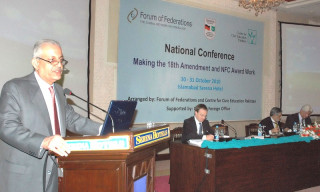ISLAMABAD: Participants at a conference on making Pakistani federalism work were in strong consensus on the transformational character of the 18th Amendment and the NFC Award for the future of Pakistani federalism. They agreed that the changes reflect clear desires across the country for a system of government which is closer to the population and to the spirit of the 1973 constitution. The conference was opened by Dr. A. Hafiz Shaikh, Minister of Finance, who admired the quality of the preparations for the conference and indicated his strong interest in what conclusions would emerge and underlined the importance of follow-up. The conference at the Serena Hotel in Islamabad was organized by the Forum of Federations, an international NGO supported by nine federal countries, and the Centre for Civic Education Pakistan, with financial support from the German Ministry. Dr. Ehtisham Ahmed played a leading role in the planning of the conference.Two former finance ministers, Mr. Sartaj Aziz and Senator Mohammad Ishaq Dar, chaired sessions and presenters included Senator Raza Rabbani, Chair of the Implementation Commission of the 18 th Amendment, and Mr. Salman Siddique, Federal Finance Secretary. Foreign experts from Germany, Argentina, Italy and Canada spoke on comparative experience in other federations in such areas as value added taxes, oil and gas regimes, and fiscal accountability, responsibility and transparency arrangements. Among over 40 participants, there was extensive discussion of both the 18th Amendment and the NFC award. A recurring theme was Pakistan’s low level of tax revenues compared to other countries at a similar level of development, and the need to enhance tax collection, including at the local and provincial levels. The transfer of competences and revenues to the provinces will also necessitate a focus on building the necessary capacity to deliver services at the local and provincial levels.The conference concluded with a panel and round table discussing future research needs, including in what areas Pakistan might look to comparative experience in other federations. Participants agreed that Pakistan already has substantial research capacity but needs to do more to mobilize and channel it so that it can be used in decision making, for example at the time of the next Finance Commission.
ISLAMABAD: Participants at a conference on making Pakistani federalism work were in strong consensus on the transformational character of the 18th Amendment and the NFC Award for the future of Pakistani federalism. They agreed that the changes reflect clear desires across the country for a system of government which is closer to the population and to the spirit of the 1973 constitution.
The conference was opened by Dr. A. Hafiz Shaikh, Minister of Finance, who admired the quality of the preparations for the conference and indicated his strong interest in what conclusions would emerge and underlined the importance of follow-up. The conference at the Serena Hotel in Islamabad was organized by the Forum of Federations, an international NGO supported by nine federal countries, and the Centre for Civic Education Pakistan, with financial support from the German Ministry. Dr. Ehtisham Ahmed played a leading role in the planning of the conference.
Two former finance ministers, Mr. Sartaj Aziz and Senator Mohammad Ishaq Dar, chaired sessions and presenters included Senator Raza Rabbani, Chair of the Implementation Commission of the 18 th Amendment, and Mr. Salman Siddique, Federal Finance Secretary. Foreign experts from Germany, Argentina, Italy and Canada spoke on comparative experience in other federations in such areas as value added taxes, oil and gas regimes, and fiscal accountability, responsibility and transparency arrangements. Among over 40 participants, there was extensive discussion of both the 18th Amendment and the NFC award.
A recurring theme was Pakistan’s low level of tax revenues compared to other countries at a similar level of development, and the need to enhance tax collection, including at the local and provincial levels. The transfer of competences and revenues to the provinces will also necessitate a focus on building the necessary capacity to deliver services at the local and provincial levels.
The conference concluded with a panel and round table discussing future research needs, including in what areas Pakistan might look to comparative experience in other federations. Participants agreed that Pakistan already has substantial research capacity but needs to do more to mobilize and channel it so that it can be used in decision making, for example at the time of the next Finance Commission.













